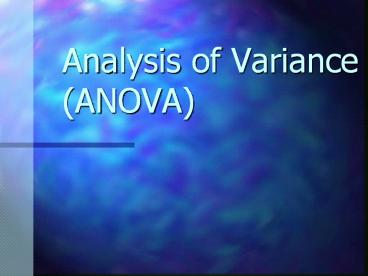Analysis of Variance ANOVA - PowerPoint PPT Presentation
1 / 30
Title:
Analysis of Variance ANOVA
Description:
Does the temperature of this lecture hall affect the rate at which Psy 60 ... M50= 1 M70= 4 M90= 1. Two possible explanations for between-groups differences: ... – PowerPoint PPT presentation
Number of Views:208
Avg rating:3.0/5.0
Title: Analysis of Variance ANOVA
1
Analysis of Variance(ANOVA)
2
Research Problem
- Does the temperature of this lecture hall affect
the rate at which Psy 60 students fall asleep
during class? - Independent Variable or Factor is Room Temp
- Three Levels 50, 70, 90 degrees
- Dependent Variable is Reaction Time
- How many minutes after the start of lecture does
the first student fall asleep?
3
Raw Data
4
ANOVA Terminology
- Single Factor Independent Measures Design
(a.k.a., One-way Design) - Factor
- Variable that is independent (manipulated) or
quasi-independent (non-manipulated, grouping) - Independent measures
- Designates that it is a between-subjects design
- How many levels does the factor have?
- Levels refers to number of treatments conditions
(groups) - k number of levels
5
When to Use ANOVA
- You may use ANOVA whenever you have 2 or more
independent groups - You must use ANOVA whenever you have 3 or more
independent groups. - Why cant we just conduct a series of t-tests
(one for each pair of sample means)? - Answer Alpha Inflation
6
Testwise and Familywise Error Rates
- Testwise a
- The probability of making a Type I Error on any
one hypothesis test. - a is about .05 for each hypothesis test
- Familywise a
- The accumulated probability of making a Type I
Error when a series of hypothesis tests are
conducted. - a is about .15 for 3 t-tests
7
The Logic of ANOVA
8
The Logic of ANOVA
- With ANOVA, we take the total variance among all
the scores in our sample (in all conditions), and
we partition that variance into 2 parts - 1. Between Groups Variance
- 2. Within Groups Variance
9
The Logic of ANOVA
- Between groups variance
- Differences between the group means
- The average amount by which the group means vary
around the grand mean. - Within groups variance
- Differences among people within the same group.
- The average amount by which scores within a group
vary around mean of their group.
10
Between Groups Variance
- Recall the means for each of the groups from our
sleeping in lecture example - M50 1 M70 4 M90 1
- Two possible explanations for between-groups
differences - Treatment Effect The differences are caused
systematic(non-random) variation due to our
independent variable manipulation. - Chance The differences are due to non-systematic
(random) variation (a) individual differences - (b) experimental (measurement) error
11
Within Groups Variance
Within Groups Variance
Between Groups Variance
12
Partitioning Total Variance
13
F-Ratio
14
F-Ratio
15
F-Ratio
16
Partitioning Total Variance
17
Hypothesis Testing with ANOVA
- Research Question
- Does room temperature affect the rate at which
students fall asleep in this class? - State the Statistical Hypothesis
- H0 µ1 µ2 ... µk
- H1 At least two of the population means are
significantly different from each other
18
Hypothesis Testing with ANOVA
- Set Decision Criteria
- To find our critical value we need
- Alpha level (.05)
- Degrees of freedom between groups
- Degrees of freedom within groups
- Decision Rule Reject H0 if observed F exceeds
critical F
19
Hypothesis Testing with ANOVA
- Set Decision Criteria (cont.)
- a .05
- Dfbetween k-1
- k number of groups 3
- For our example
- dfbetween3-12
- Dfwithin N-k
- For our example
- N 15
- dfwithin N-k 15 3 12
20
Hypothesis Testing with ANOVA
- Set Decision Criteria (cont.)
- From the F table,
- F(2,15)3.88
- Reject Ho if F obtained 3.88
- Compute F Ratio
21
Hypothesis Testing with ANOVA
- Compute the F-Ratio
- First, Compute Summary Statistics Get Organized
(T, G, SX2, n, M, SS for each group) - Then
- 1. Compute Sum of Squares SSWithin, SSBetween,
SSTotal - 2. Compute degrees of freedom dfWithin,
dfBetween,dfTotal - 3. Compute two Mean Squares MSWithin, MSBetween
- 4. Compute the F-Ratio F MSBetween/ MSWithin
22
Computing the F-Ratio
23
Hypothesis Testing with ANOVA
24
Hypothesis Testing with ANOVA Computing SS
- SSwithin
- SSbetween
25
Hypothesis Testing with ANOVA Computing SS
- SSTotal
26
Hypothesis Testing with ANOVA Compute MS
- 1. Compute Degrees of Freedom
- dfbetween k-1 3-1 2
- dfwithin N-k 15-3 12
- dftotal N-1 15-1 14 or
- dftotal dfbetweendfwithin 2 12 14
27
Hypothesis Testing with ANOVA Compute MS
- 2. Compute MS
- MSBetween SSBetween/dfbetween
- MSBetween 30/2 15
- MSWithin SSWithin/dfWithin
- MSWithin 16/12 1.33
28
Hypothesis Testing with ANOVA Compute F Ratio
- F Ratio
- F MSBetween / MSWithin
- F 15/1.33 11.28
- Make a Decision
- Reject Ho if Fobtained Fcritical
- Reject Ho 11.283.88
- Room temperature significantly affects the rate
at which students fall asleep, F(2,12)11.28,
p
29
F Source Table
30
Effect Size for ANOVA
- For our data ?2 SSbetween/SStotal
- 30/46 .65































